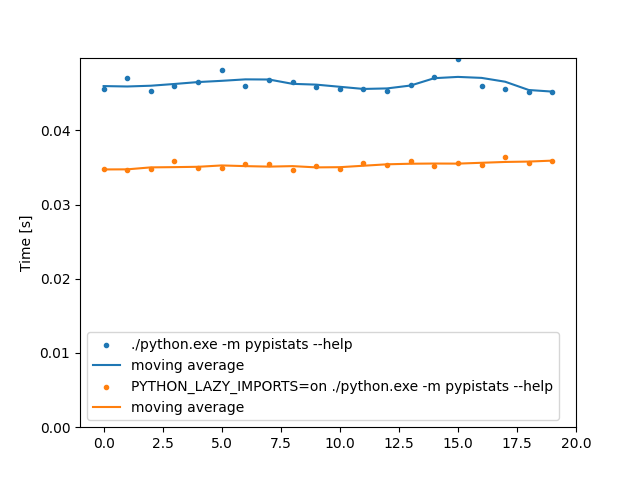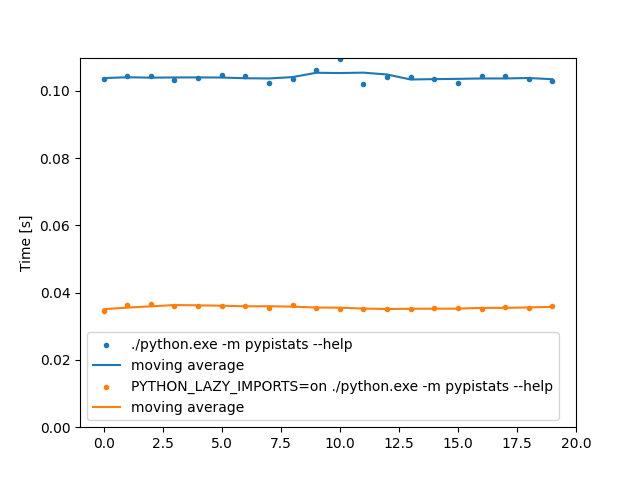Three times faster with lazy imports

Table of Contents
PEP 810 proposes “explicit lazy imports” for Python 3.15:
Lazy imports defer the loading and execution of a module until the first time the imported name is used, in contrast to ‘normal’ imports, which eagerly load and execute a module at the point of the import statement.
By allowing developers to mark individual imports as lazy with explicit syntax, Python programs can reduce startup time, memory usage, and unnecessary work. This is particularly beneficial for command-line tools, test suites, and applications with large dependency graphs.
It’s not been accepted yet, but let’s try out the reference implementation on one of my CLI tools, pypistats.
Setup #
First fetch the reference implementation. From a CPython checkout:
git remote add LazyImportsCabal https://github.com/LazyImportsCabal/cpython
git fetch LazyImportsCabal
gco lazy # see https://hugovk.dev/blog/2025/my-most-used-command-line-commands/
Because we want to install NumPy and pandas, let’s pretend to be Python 3.14 so we can use the binary wheels instead of having to build from source:
--- a/Include/patchlevel.h
+++ b/Include/patchlevel.h
/* Version parsed out into numeric values */
/*--start constants--*/
#define PY_MAJOR_VERSION 3
-#define PY_MINOR_VERSION 15
+#define PY_MINOR_VERSION 14
#define PY_MICRO_VERSION 0
#define PY_RELEASE_LEVEL PY_RELEASE_LEVEL_ALPHA
#define PY_RELEASE_SERIAL 0
/* Version as a string */
-#define PY_VERSION "3.15.0a0"
+#define PY_VERSION "3.14.0a0"
/*--end constants--*/
--- a/configure.ac
+++ b/configure.ac
-m4_define([PYTHON_VERSION], [3.15])
+m4_define([PYTHON_VERSION], [3.14])
Build non-debug CPython with optimisations:
GDBM_CFLAGS="-I$(brew --prefix gdbm)/include" \
GDBM_LIBS="-L$(brew --prefix gdbm)/lib -lgdbm" \
./configure --enable-optimizations --with-lto \
--with-system-libmpdec --config-cache \
--with-openssl="$(brew --prefix openssl@3)" && make -s -j8
Install NumPy and pandas:
./python.exe -m pip install numpy pandas
And then an editable install of the CLI, because we’ll also test changing the imports:
./python.exe -m pip install -e ~/github/pypistats
Let’s check the dependencies with pipdeptree:
uvx "pipdeptree[graphviz]" --python ./python.exe --packages pypistats --graph-output svg > pipdeptree.svg
pypistats has seven direct dependencies, which result in a total of 41 dependencies six layers deep, not counting NumPy and pandas:
Benchmarks #
Let’s benchmark running pypistats --help, which is meant to be quick, using
hyperfine:
brew install hyperfine
Inline imports #
In the pypistats CLI, I had already applied the trick of moving heavier imports into the functions that call them (the PEP calls these “inline imports”).
Instead of the lazy keyword, I’m
using the
PYTHON_LAZY_IMPORTS env var
here to make it easy to compare two different runs.
$ hyperfine --warmup 10 --runs 20 --export-json out.json \
"./python.exe -m pypistats --help" \
"PYTHON_LAZY_IMPORTS=on ./python.exe -m pypistats --help"
Benchmark 1: ./python.exe -m pypistats --help
Time (mean ± σ): 46.2 ms ± 1.1 ms [User: 38.8 ms, System: 6.4 ms]
Range (min … max): 45.1 ms … 49.6 ms 20 runs
Benchmark 2: PYTHON_LAZY_IMPORTS=on ./python.exe -m pypistats --help
Time (mean ± σ): 35.3 ms ± 0.5 ms [User: 29.5 ms, System: 4.8 ms]
Range (min … max): 34.6 ms … 36.3 ms 20 runs
Summary
PYTHON_LAZY_IMPORTS=on ./python.exe -m pypistats --help ran
1.31 ± 0.04 times faster than ./python.exe -m pypistats --help
Plotted with plot_progression.py:

From 46 to 35 milliseconds, or, 1.31 times faster, not bad.
Fully lazy #
But we no longer need the inline imports trick with PEP 810!
I modified the CLI so all imports are at the top, and also removed if TYPE_CHECKING:
guards. Here’s a
diff.
$ hyperfine --warmup 10 --runs 20 --export-json out2.json \
"./python.exe -m pypistats --help" \
"PYTHON_LAZY_IMPORTS=on ./python.exe -m pypistats --help"
Benchmark 1: ./python.exe -m pypistats --help
Time (mean ± σ): 104.1 ms ± 1.6 ms [User: 88.2 ms, System: 14.5 ms]
Range (min … max): 101.9 ms … 109.5 ms 20 runs
Benchmark 2: PYTHON_LAZY_IMPORTS=on ./python.exe -m pypistats --help
Time (mean ± σ): 35.7 ms ± 0.5 ms [User: 29.8 ms, System: 4.8 ms]
Range (min … max): 34.7 ms … 36.5 ms 20 runs
Summary
PYTHON_LAZY_IMPORTS=on ./python.exe -m pypistats --help ran
2.92 ± 0.06 times faster than ./python.exe -m pypistats --help

From 104 to 36 milliseconds, or 2.92 times faster, much better!
Header photo: “Lazy Man Fishing” at Cascade Locks on the Columbia River 05/1973 in the U.S. National Archives , with no known copyright restrictions.